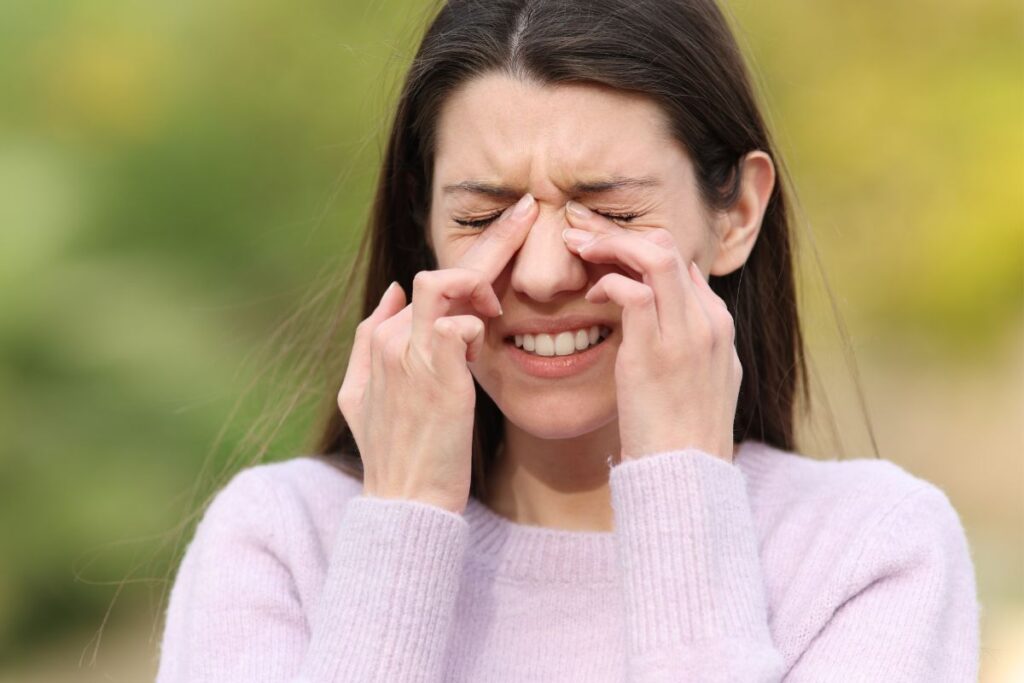Do your eyes feel constantly dry, irritated, or gritty, even when you’re just sitting in front of a screen or reading? If yes, then they might be begging for your attention, as you can suffer from dry eyes, an annoying condition that can affect your vision and your quality of life if not addressed at the right time.
What Are Dry Eyes?
When your eyes don’t make enough tears or when they dry up too quickly to maintain a comfortable and moist surface, you get dry eye disease (DED). Without the tear film, your eyes may feel itchy, burning, and even grainy. It is important to preserve the health of the eyes. Dry eyes affect people of all ages and millions of people globally.
But these are most common in people aged 50 and older and mostly affect women, especially post-menopausal women, due to hormonal changes. Environmental factors, medications, and certain medical conditions can make the condition worse.
Common Causes of Dry Eyes:
1. Aging: As we get older, the tear glands become less efficient, which reduces the amount of tears produced. This is particularly evident after the age of 50.
2. Environmental Factors: Exposure to dry air, wind, smoke, or long-term use of air conditioning can lead to rapid evaporation of the tear film, causing dryness.
3. Digital Eye Strain: Staring at screens for prolonged periods can lead to reduced blinking, which prevents the eyes from receiving adequate moisture, leading to dryness and irritation.
4. Medications: Certain medicines, such as antihistamines, blood pressure medications, and antidepressants, can reduce tear production and exacerbate dry eye symptoms.
5. Health Conditions: Dry eyes can be a result of root causes, such as autoimmune diseases (like Rheumatoid Arthritis), diabetes, and thyroid disorders. Conditions like blepharitis (inflammation of the eyelids) can also contribute to dry eyes.
6. Hormonal Changes: Hormonal fluctuations that happen in women during their pregnancy or when their menopausal period starts can affect tear production and lead to dry eyes.
Symptoms of Dry Eyes:
● Gritty or sandy sensation: feeling like something is stuck in your eye.
● Redness: inflammation or blood vessels in the eye becoming more visible.
● Burning or stinging: A burning sensation that worsens with screen time or air conditioning.
● Blurry vision: Vision may appear blurry but typically clears after blinking.
● Increased tearing: Oddly, the dryness can cause the eyes to produce more tears, which can result in watery eyes that don’t provide adequate moisture.
How Dry Eyes Are Treated:
Dry eyes can be effectively treated with a mix of lifestyle modifications, medical treatments, and home remedies, even though it cannot always be “cured” completely. Here are some treatment options:
1. Artificial Tears: Over-the-counter artificial tears are the first line of defense for dry eye symptoms. These lubricate the eyes and help replenish the tear film.
2. Prescription Medications: If over-the-counter solutions aren’t enough, your doctor may prescribe anti-inflammatory drugs or steroid eye drops to minimise inflammation and promote tear production.
3. Punctal Plugs: These small, biocompatible devices are placed into the tear ducts to stop tears from drying too quickly, ensuring moisture stays on the eye’s surface longer.
4. Warm Compresses and Lid Hygiene: For those with blepharitis or clogged meibomian glands (which help produce the oily layer of the tear film), warm compresses can open up these glands, improving the quality of the tears and reducing symptoms of dryness.
5. Surgical Options: In rare cases, surgical options like pterygium removal or salivary gland transplant (for severe cases) may be considered.
Myth-Busting About Dry Eyes:
● Myth: Dry eyes are only caused by not drinking enough water.
Fact: dehydration alone does not cause dry eyes; insufficient tear production or excessive evaporation can also lead to dry eyes.
● Myth: Artificial tears are harmful and can worsen dry eye disease.
Fact: If artificial tears are made without adding any preservative, then you are good to go with using them as they can provide relief without worsening symptoms. But don’t overuse drops with preservatives; they can irritate the eyes.
FAQ Section
Can dry eyes be permanently treated
The answer is a simple “no,” but it can surely be managed with treatment options like lubricating drops, medications, and lifestyle adjustments.
Can dry eyes lead to permanent vision damage?
If untreated, severe dry eyes can cause damage to the surface of the eye, making the eyes more vulnerable to infections, which can result in permanent damage.
Are there any home remedies for dry eyes?
Yes, using a humidifier, taking frequent breaks from screen time, and applying warm compresses can help alleviate dry eye symptoms.
How HealthPil Can Help:
HealthPil connects you with top ophthalmologists who specialize in diagnosing and managing dry eyes. Whether you need prescription eye drops, punctal plugs, or guidance on lifestyle changes to reduce dry eye symptoms, HealthPil is here to help.
Disclaimer:
This article is for informational purposes only and should not replace professional medical advice. Always consult a healthcare provider to properly diagnose and manage dry eye disease.

